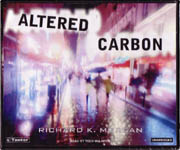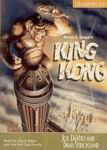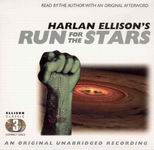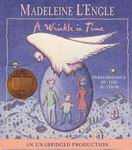
 Altered Carbon
Altered Carbon
By Richard K. Morgan; Read by Todd McLaren
14 CDs or 2 MP3-CDs – 14 Hours 54 Minutes [UNABRIDGED]
Publisher: Tantor Media
Published: 2005
ISBN: 1400101379 (Retail CDs), 1400131375 (Library CDs), 1400151376 MP3-CDs
Themes: / Science Fiction / Mystery / Cyberpunk / Immortality / Artificial Intelligence / Galactic Civilization / Conciousness Uploading / Hardboiled Fiction / Noir Fiction /
“Fuelled by every crime noir novel I’d ever read, plus swabs of French and Japanese cinema, the work of William Gibson and M. John Harrison, early Poul Anderson and Bob Shaw, and last but not least the colossal impact of Bladerunner, this was my take on future noir. Fast forward to middle of the new millenium, and down where it counts, nothing has changed, because neither have we. Enter Takeshi Kovacs.”
–Richard K. Morgan
Altered Carbon is a stunning debut novel. A near classic, it boils over with solid SF ideas all encased in violent and vivid prose as told in a hardboiled first person narration. Set a few hundred years in the future, humanity has started colonizing the galaxy under the supervision of the United Nations. From one such world comes Takeshi Kovacs, an ex-U.N. Envoy (interplanetary special forces) who’s been brought to Earth in order to work as a private detective for a murdered “Meth”. Meths are the ultra rich, able to afford new cloned bodies so that they can live forever. This is achieved by means of the “cortical stack” technology, a backup harddrive for one’s mind, implanted in the skull shortly after birth. Most people can’t afford to be “re-sleeved” after they die, and so languish in storage for centuries. Convicted criminals have their bodies sold out from under them.
Interplanetary travel is done by way of “needlecast”, a form of faster than light transmission of data. No bodies are transported – visitors from distant planets are re-sleeved in a local body. With these technologies many of society’s values have changed. “Real death” is rare, “organic damage” is far more common. And even real death, the destruction of a cortical stack, isn’t necessarily the end since the ultra rich keep backups. Needlecast transmission of stack’s data on a regular basis makes one virtually immortal. Like working with any fallible system though you just have to remember to backup, and frequently.
Laurens Bancroft, a centuries old tycoon brought Kovacs to Earth in order to investigate his apparent suicide, something the Meth thinks was really a murder – though he can’t say for sure as he was backed up 48 hours before his death. The investigation leads Kovacs into a tangled web of politics, prostitution and power games with stakes as high as an immortal lifespan can offer. Thrown into the mix is a dirty cop, his driven parter, an artifically intelligent hotel, and a whole lot of bloodshed.
Though at first blush this appears to be a straight out neo-cyberpunk novel, it has more depth. The mystery and hardboiled elements are a direct homage to Raymond Chandler’s The Big Sleep with Kovacs in the Philip Marlowe role. Like The Big Sleep, Altered Carbon is complicated and hard to follow, with many characters double and triple-crossing each other. SF elements, like the conciousness uploading, are not particularily new, but Morgan’s take is, and it is well integrated into the plot. One scene which has Kovacs “cross-sleeved” into a female body for investigative purposes illustrates just how wild the concept of this kind of mind swapping can be.
There are several lengthy sex scenes and even more combat scenes. I liked the way they were handled (some of the descriptions were positively Gibsonian) but I grew fatigued at their numerousness and frequency. Another problem was the over-use of “neuro chem” as a cure all for crisis situations. UN Envoy training allows envoys to battle harder and smarter than anyone without such training, so whenever things get rough for Takeshi, and they get rough frequently, he falls back on his “neuro chem.” The problem there is it ends up working like an inexaustible turbo boost – he’s too powerful, too skilled for sustained anxiety on the part of the reader. Like Neo in the second and third Matrix movies, we stop caring. On the other hand, the plot twists delightfully defy expectation and are cleverly rendered. The way the story is told is reminiscent of the best kinds of noir fiction. It is as solid a modern science fiction novel that reads better than any first novel has any right to be.
Tantor sent us the Library bound CD edition, which came in a clamshell stlye plastic case. Durable and easily accessed. Sound quality is near flawless with high recording levels. Narrator Todd McLaren is Takeshi Kovacs, and his reading is cool and smooth like the confident interstellar hard-case he’s portraying. There are at least a half dozen female roles he’s equally adroit with, some of which required breathy libidinousness, some irate rage. I look forward to an encore performances in the sequel, Broken Angels.
Incidentally, Tantor Media snapped up all four of the Richard K. Morgan novels released so far, you can check them out HERE along with more than a dozen other Science Fiction and Fantasy titles available so far. Tantor is becoming a solid source for SF&F audio goodness.
Posted by Jesse Willis

 Merian C. Cooper’s King Kong
Merian C. Cooper’s King Kong




